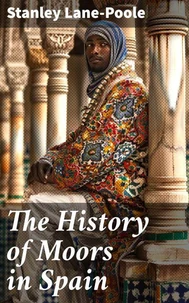The Moors in Spain
Par :Formats :
Disponible dans votre compte client Decitre ou Furet du Nord dès validation de votre commande. Le format ePub est :
- Compatible avec une lecture sur My Vivlio (smartphone, tablette, ordinateur)
- Compatible avec une lecture sur liseuses Vivlio
- Pour les liseuses autres que Vivlio, vous devez utiliser le logiciel Adobe Digital Edition. Non compatible avec la lecture sur les liseuses Kindle, Remarkable et Sony
 , qui est-ce ?
, qui est-ce ?Notre partenaire de plateforme de lecture numérique où vous retrouverez l'ensemble de vos ebooks gratuitement
Pour en savoir plus sur nos ebooks, consultez notre aide en ligne ici
- Nombre de pages168
- FormatePub
- ISBN859-65--4739286-6
- EAN8596547392866
- Date de parution13/11/2022
- Protection num.Digital Watermarking
- Taille3 Mo
- Infos supplémentairesepub
- ÉditeurDIGICAT
Résumé
In "The Moors in Spain, " Stanley Lane-Poole delves into the historical and cultural impact of the Moorish presence in the Iberian Peninsula from the 8th to the 15th centuries. Employing a narrative style that blends meticulous research with vivid storytelling, Lane-Poole encapsulates the richness of Moorish contributions to Spanish architecture, art, science, and philosophy. The book is situated within the context of late 19th-century European historiography, which often romanticized the Islamic influence on Europe, offering readers a comprehensive understanding of a transformative period in Spanish history that has fueled scholarly debate ever since.
Stanley Lane-Poole was a prominent British historian and archaeologist whose extensive travels in Spain and North Africa enriched his perspectives on Moorish civilization. His deep admiration for the Islamic art and culture, coupled with his thorough academic background, drove him to illuminate a facet of history that he felt was often overshadowed. Lane-Poole's expertise allowed him to weave an intricate narrative that not only informs but also engages the reader's imagination, showcasing the harmonious coexistence of diverse cultures and their legacies.
This book is highly recommended for anyone interested in medieval history, cultural studies, or the enduring influence of the Islamic world on Western civilization. Lane-Poole's scholarly yet accessible prose invites both academics and general readers to explore the profound legacy of the Moors in Spain, making it a crucial addition to the library of anyone seeking to understand the complexities of cultural identity and historical narrative.
Stanley Lane-Poole was a prominent British historian and archaeologist whose extensive travels in Spain and North Africa enriched his perspectives on Moorish civilization. His deep admiration for the Islamic art and culture, coupled with his thorough academic background, drove him to illuminate a facet of history that he felt was often overshadowed. Lane-Poole's expertise allowed him to weave an intricate narrative that not only informs but also engages the reader's imagination, showcasing the harmonious coexistence of diverse cultures and their legacies.
This book is highly recommended for anyone interested in medieval history, cultural studies, or the enduring influence of the Islamic world on Western civilization. Lane-Poole's scholarly yet accessible prose invites both academics and general readers to explore the profound legacy of the Moors in Spain, making it a crucial addition to the library of anyone seeking to understand the complexities of cultural identity and historical narrative.
In "The Moors in Spain, " Stanley Lane-Poole delves into the historical and cultural impact of the Moorish presence in the Iberian Peninsula from the 8th to the 15th centuries. Employing a narrative style that blends meticulous research with vivid storytelling, Lane-Poole encapsulates the richness of Moorish contributions to Spanish architecture, art, science, and philosophy. The book is situated within the context of late 19th-century European historiography, which often romanticized the Islamic influence on Europe, offering readers a comprehensive understanding of a transformative period in Spanish history that has fueled scholarly debate ever since.
Stanley Lane-Poole was a prominent British historian and archaeologist whose extensive travels in Spain and North Africa enriched his perspectives on Moorish civilization. His deep admiration for the Islamic art and culture, coupled with his thorough academic background, drove him to illuminate a facet of history that he felt was often overshadowed. Lane-Poole's expertise allowed him to weave an intricate narrative that not only informs but also engages the reader's imagination, showcasing the harmonious coexistence of diverse cultures and their legacies.
This book is highly recommended for anyone interested in medieval history, cultural studies, or the enduring influence of the Islamic world on Western civilization. Lane-Poole's scholarly yet accessible prose invites both academics and general readers to explore the profound legacy of the Moors in Spain, making it a crucial addition to the library of anyone seeking to understand the complexities of cultural identity and historical narrative.
Stanley Lane-Poole was a prominent British historian and archaeologist whose extensive travels in Spain and North Africa enriched his perspectives on Moorish civilization. His deep admiration for the Islamic art and culture, coupled with his thorough academic background, drove him to illuminate a facet of history that he felt was often overshadowed. Lane-Poole's expertise allowed him to weave an intricate narrative that not only informs but also engages the reader's imagination, showcasing the harmonious coexistence of diverse cultures and their legacies.
This book is highly recommended for anyone interested in medieval history, cultural studies, or the enduring influence of the Islamic world on Western civilization. Lane-Poole's scholarly yet accessible prose invites both academics and general readers to explore the profound legacy of the Moors in Spain, making it a crucial addition to the library of anyone seeking to understand the complexities of cultural identity and historical narrative.




